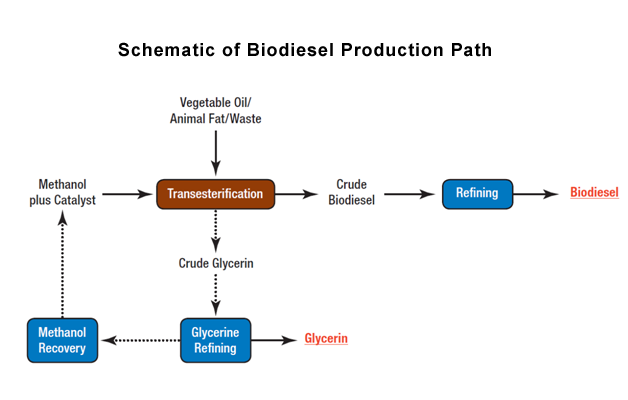Table of Contents
Biodiesel is a fuel, formed by the process of transesterification. It is produced from vegetable oil, animal fats, yellow grease and used cooking oil. The transesterification of these things results in it. The glycerin is formed as a co-product.
Production
It is generated from vegetable oils, yellow grease, used cooking oils, or animal fats. The fuel is produced by transesterification—a process that converts fats and oils into the required product and glycerin (a coproduct).
Approximately 100 pounds of oil or fat are reacted with 10 pounds of a short-chain alcohol (usually methanol) in the presence of a catalyst (usually sodium hydroxide [NaOH] or potassium hydroxide [KOH]) to form 100 pounds of required product and 10 pounds of glycerin (or glycerol).
Co product
Glycerin, a coproduct, is a sugar commonly used in the manufacture of pharmaceuticals and cosmetics.
What kinds of biodiesel should not be used as a fuel?
- Raw or refined plant oil or recycled greases should not be processed into bio-diesel, are not biodiesel, and should not be used as a vehicle fuel.
- Fats and oils (triglycerides) are much more viscous than biodiesel, and low-level vegetable oil blends can cause long-term engine deposits, ring sticking, lube-oil gelling, and other maintenance problems that can damage an engine.
Schematic representation of the production of Biodiesel (a safe fuel for environment)

Uses as a fuel
- To run agricultural Machinery
- used as a vehicle fuel, improves public health
- provides safety benefits
- contributes to a resilient transportation system
Others notes related to DBT-2024
Other topics for DBT-2024 :
- Nodulation in leguminous plants : https://thebiologyislove.com/the-formation-of-nodule-by-rhizobium-species/
Follow us on Social media for daily update
Facebook Link: https://www.facebook.com/share/r/29SmQRzarXGDbHeb/?mibextid=oFDknk
Instagram Link: https://www.instagram.com/reel/C4lOvqtRnLn/?igsh=MTN1MnRqcHlmZTl4OQ==
